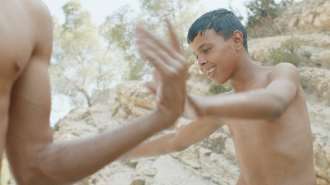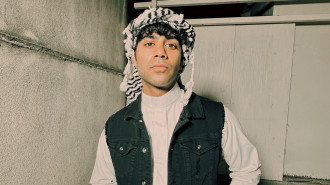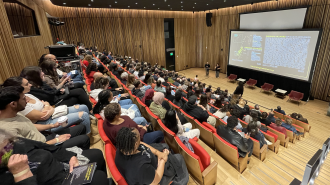
'Every film should exist': Joyland filmmaker Saim Sadiq on the politics of banning a film and the trans community in Pakistan

When a film gets banned in certain countries, whether it be for political or moral reasons, it often inadvertently contributes even more to the film’s publicity campaign.
People start debating its issues as an abstract, rather than discussing what the film is actually about. The conversation turns to questioning the ethics of cinema: should people really have the power to ban a film, even if its contents are deemed controversial? And what does this reveal about a country which deems a film too taboo to be screened?
Joyland, Saim Sadiq’s debut feature about a “happily patriarchal” family and a transgender dancer working at an erotic theatre in Lahore, is a perfect example of this debate.
Except that while most banned films in history usually get censored outside their home country, this one was (mostly) banned and created controversy in the place in which the film is set and the cast and crew are from: Pakistan.
"Everybody was voicing their opinion without having seen the film just by virtue of what it was about, and I was like: It's a film. It's a two-hour-long experience. You cannot explain it or claim to know all about it by just reading a logline... Their words are very reductive, and cinema is not"
Joyland was released in UK cinemas on February 24 and Saim continues to emphasise that films ought to be discussed and debated rather than censored. “I think every film should exist. Even a film that I don't agree with politically, I would vouch for its right to exist,” he said.
Joyland has gone some way in reviving Pakistan's nascent film industry. Executive produced by the youngest Nobel laureate, Malala Yousafzai, and produced by All Caps and Khoosat Films in association with Diversity Hire Ltd, One Two Twenty Entertainment, Blood Moon Creative, Film Manufacturers Inc, Astrakan AB, and Noruz Films, Joyland has been garnering international acclaim for nearly a year.
It had its world premiere at the 75th Cannes Film Festival on 23 May 2022 in the Un Certain Regard section. It was the first ever Pakistani film to be officially selected at Cannes, where it received a standing ovation and won the prestigious Jury Prize.
Since then, it’s premiered at major film festivals around the world, including in Toronto, Melbourne, London and Sundance. It also became the first Pakistani film to be shortlisted for the Oscars, although it didn’t make the final cut of the five nominees.
An outsider might think that such a widely acclaimed independent film might make the Pakistani government proud, but not so much for Joyland.
Although the film is more about complex family dynamics and the characters’ attempts to defy patriarchal norms in Pakistan, it also features a trans love story between a young man and a trans woman. It’s the first time a romance between a boy from Lahore and a trans woman is depicted in Pakistani cinema.
Rather unsurprisingly, traditional critics in Pakistan were quick to condemn the film. Around the same time that it became shortlisted for the Oscars, Joyland faced a ban in its home country for being “un-Islamic,” “containing objectionable material”, and for going against “morality and decency.”
The federal government then rescinded its ban and the film was scheduled for nationwide release on November 18, but less than a day after this decision, the Punjab government blocked the film’s release in the province.
A real shame for the filmmaker, considering half of the film is spoken in Punjabi and the film is set in Punjab. Currently, Joyland is still blocked in Punjab, although the film’s team have managed to get permission to screen it in two of Pakistan's other provinces: Sindh and Islamabad.
“I was surprised by the level of controversy and the level of importance that a small independent film like this one got,” Saim Sadiq told The New Arab, “where it really became all anybody spoke about for a whole month on television channels, in living rooms, at parties.”
"There have been legal wins and constitutional wins that the trans community in Pakistan has been able to get, but that doesn't really change the reality on the ground, which is that they're still a very marginalised community"
Saim was calm and composed when discussing the film’s partial banning, but said that his main concern is that – as is often the case when films become banned – the film’s criticisms were led by people who hadn’t even seen or tried to intellectually engage with the film.
“I'm very happy and proud and I own the political leaning of the film, very much so,” he said. “But the film was politicised to a certain level that it became unimportant to actually talk about the film after watching it. Everybody was voicing their opinion without having seen the film just by virtue of what it was about, and I was like: It's a film. It's a two-hour-long experience. You cannot explain it or claim to know all about it by just reading a logline... Their words are very reductive, and cinema is not.”
For many people unfamiliar with Pakistani culture, public representations of the LGBTQ+ community might seem surprisingly progressive, but in fact, Pakistan has a long history of acknowledging the presence of trans and intersex people, who are called “khwaja siras,” meaning the “third gender” community.
The “khwaja siras” has traditionally held a position of prestige within the Muslim Subcontinent, teaching courtesy and poetry to princes and princesses in the Mughal courts between the 16th and 19th centuries.
The community has long been fighting for rights and has won significant success in recent years.
In 2012, they were given the right to vote and identify their gender on the national identity cards by the supreme court of Pakistan, and in 2018 the country passed the Transgender Persons Act, which in theory gave the community basic civil protections.
On top of this, Pakistan also has several transgender-only madrasas, or Islamic religious schools, making it one of the only Muslim-majority countries to have such educational centres.
|
But despite these seeming claws, discrimination against the LGBTQ+ community in Pakistan is still normalised. Amnesty International has for instance reported that since September 2021, 18 transgender people have been reported killed in Pakistan. In Joyland, Saim subtly depicts both the important presence of the “khwaja siras” in Pakistani society, as well as their continued defiance to fight for their rights and against abuse.
“Yes, there have been legal wins and constitutional wins that the trans community in Pakistan has been able to get, but that doesn't really change the reality on the ground, which is that they're still a very marginalised community, and they do face a lot of violence and they do face a lot of discrimination,” Saim said.
“Certainly, when it comes to looking at them as human beings who can have desire, that really becomes very problematic,” the filmmaker added. “Desire for any human being is kind of taboo, and then add desire to a trans person, and it becomes an even bigger taboo.”
Saim is well aware that the film can’t be separated from politics, nor from its trans love story, but really, it is a film about much more than that, and he hopes viewers see it this way too.
It’s a coming-of-age story intertwined with Pakistani culture and the trans community, but also about the guilt surrounding tradition and a conservative family’s expectations, as well as the collective struggle to resist patriarchy.
It’s also a film that was deeply personal and semi-autobiographical to Saim, whose only previous work was a short film called Darling was a research project for Joyland and uncovering the “world of erotic theatre in Lahore.”
“It's the world that I know the most,” he said, and “these are things that were perhaps the most visible and obvious parts of me growing up.”
But have the controversies surrounding the release of Joyland put off Saim from making another film on the queer and trans community?
Not necessarily, as he said it’s important that an audience always questions what queer cinema is, or how queerness on screen is translated – to even find it implied through a film’s tone.
Just before he left for another premiere screening of Joyland on its UK-wide tour, Saim concluded, with his distinctive sense of humour and candidness: “Even if it's a film about all straight people, I'll make sure that you somehow feel the queerness.”
Alexander Durie is a Multimedia Journalist for The New Arab. His stories focus on social movements, migration issues, and the arts & culture of the SWANA region. He has contributed to The Guardian, Al Jazeera English, The Economist, The Independent, and more.
Follow him on Twitter: @alexander_durie






 Follow the Middle East's top stories in English at The New Arab on Google News
Follow the Middle East's top stories in English at The New Arab on Google News


